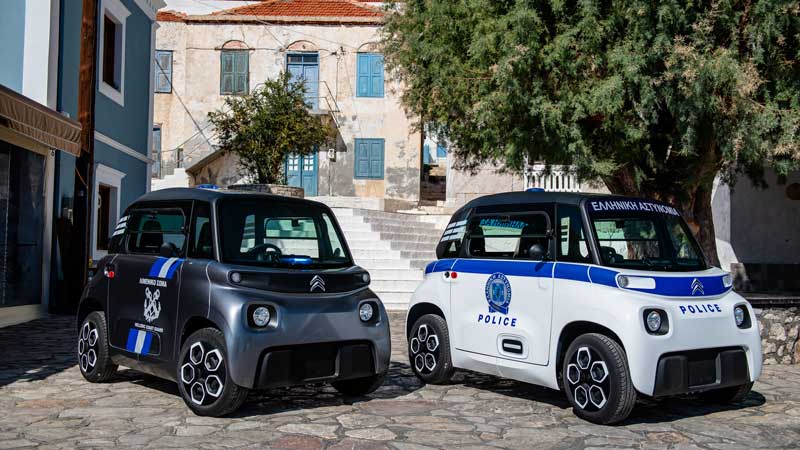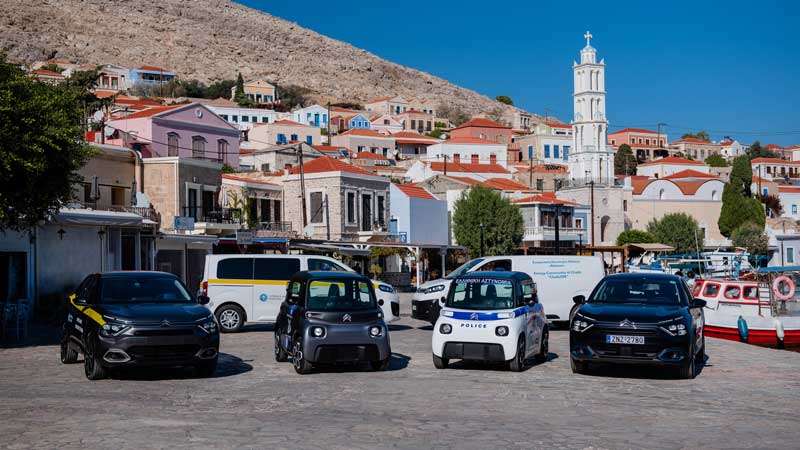The small Greek island of Chalki has debuted what is effectively the world’s slowest electric police car provided by French automotive brand Citroën for the local police force and coast guard.
Chalki, also written as Halki, is located in the Dodecanese archipelago in the Aegean Sea, actually closer to mainland Turkey than it is to mainland Greece, and like other island provinces before it, is looking to transform itself into a zero-emission economy to become the first Greek Eco island.
French automaker Citroën has partnered with the island of Chalki and the Greek Government where it will invest and take part in the island’s transition to becoming a fully sustainable and zero-emission mobility energy economy.
As part of their new partnership, Citroën has provided a fleet of six fully electric vehicles to the local Chalki public authorities.
Citroën provided 2 vehicles known as Ami to the Police and Coast guard respectively, along with two ë-C4 and one ë-Spacetourer to the Municipality of Chalki and one ë-Jumpy will also be delivered to the Energy Community of Chalki.

Two of the vehicles provided will be leased free of charge for 48 months to the Chalki public authorities, after which Citroën will buy back the cars and donate them to the Chalki Municipality.
While it is unlikely any of Australia’s police departments will be considering Citroën EVs like the Ami – which only boasts a top speed of 45km/h and a total all-electric range of only 70-kilometres – the Ami will be perfect for the small island, with its tight and narrow streets (as seen in the video above) and minimal driving distances.
Chalki is renowned for its beautiful and secluded beaches, some of which are accessible only by foot. As such, a quick trip to Google Maps shows that the longest driveable distance between two points measures only 10 kilometres – from the Monastery of St. John in the island’s interior to Kania Beach on the island’s east coast.

While the two smallest vehicles are the two Citroën Amis, the other vehicles provided include two vans – the ë-Spacetourer and the ë-Jumpy – and two ë-C4, normally seen as a five-door family hatch.
“This collaboration is completely in keeping with the spirit of Citroën, an innovative and daring brand, closely connected with people in their daily lives and their mobility,” said Vincent Cobée, CEO of Citroën.
“This project will change the lives of a few for now, but this is just the beginning. By helping Chalki to become a green economy with zero emissions, Citroën is paving the way for a better future and is showing that electrification is the way forward.”
Also participating in the Chalki’s ambition of becoming Greece’s first eco island are Citroën’s Greek importer Syngelidis Group, as well as Vinci and Akuo Greece.
As part of the larger effort to decarbonise the island of Chalki, Citroën and Syngelidis Group are also making available to residents and businesses of the island the opportunity to acquire EVs at affordable prices through a range of green and smart mobility options. This will not only include traditional four-wheel EVs, but also light quadricycles.
Joshua S. Hill is a Melbourne-based journalist who has been writing about climate change, clean technology, and electric vehicles for over 15 years. He has been reporting on electric vehicles and clean technologies for Renew Economy and The Driven since 2012. His preferred mode of transport is his feet.

